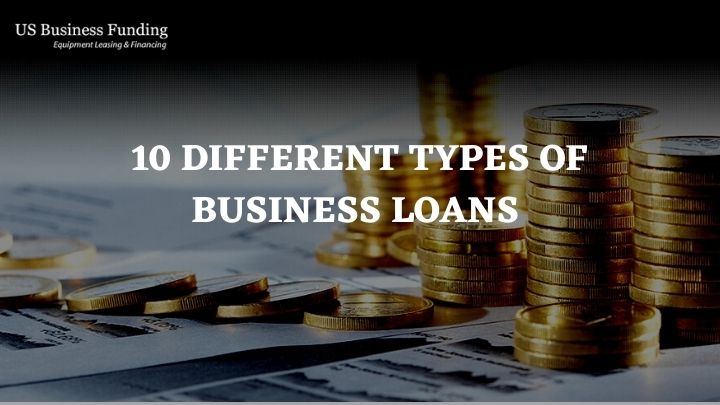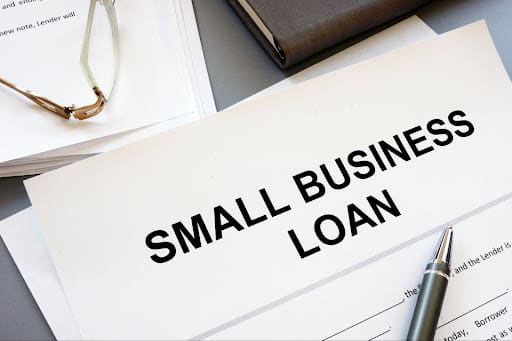10 Different Types of Business Loans
Posted on: June 2, 2022 | Category: Fund Your Business·Small Business Loans

Loans play a vital role in the expansion of all big and small businesses, irrespective of how big they are. There are numerous types of small business loans that one can pick when raising working capital for the business.
The business financing option to be picked depends on numerous factors like where you would be utilizing the funds, how long it would take you to repay the loan, and how good your credit score is. Irrespective of how you choose to balance these factors, you can certainly find the right option for your specific financial requirements.
Acquiring a small business loan might not look like a tedious task initially. However, that will change once you start researching the numerous types of loans that exist and how many lenders offer those loans. Then you might be overwhelmed by so many small business loan options that you didn’t even know existed before.
In order for you to find the right business loan or a personal loan for your enterprise, you can find the list of 10 popular types of loans for business.
1. Business Line Of Credit:
Business lines of credit might be the best for you if flexibility is a major consideration. One can get an amount of between $1,000-$500,000. The amount of lines of credit will be available in one to two weeks. The interest rates can vary from 8 to 24%. The maturity is likely to be between 1-2 years. As the business line of credit is always revolving.
So, instead of receiving a lump sum, one can access the cash flow as many times as needed. Meeting the requirement for a business line of credit is pretty easy. Most likely small business owners can be good candidates if they have been running a business for at least six months, making $50,000 or more in annual revenue, and have maintained a credit score of 560 or higher.
For the application process of unsecured credit lines, the online lender may need you to make a personal guarantee as it would allow the lender to extract your personal assets in case you default on the credit line.
2. Term Loans:

A business term loan is one of the most popular types of loans for business. Here, the borrower can receive a lump sum of cash upfront. That amount can be returned with interest over a predetermined period.
Numerous online lenders give term loans even up to the loan amount of $1 million. In comparison to many banks that offer small business loans, these lenders can provide funding at a much faster pace.
There are numerous advantages of taking a term loan. Getting the entire money upfront can help you scale your business right away and help you with the cash flow.
They usually give you the opportunity to borrow more money in comparison to other types of business financing. The processing amount can be pretty quick if you go ahead with a lender compared to other sources like banks. The lenders might process everything within a couple of days or weeks rather than taking numerous months.
However, there are many drawbacks when it comes to these loans as well. Most loans need a guarantee or collateral. This usually includes an asset like equipment or machinery of the business and existing property.
If the business owners default, then the lender can also sell the collateral as per the contract. The rate of interest differs between lenders and banks. Most of the time, online lenders charge a higher rate compared to banks.
A term loan can be an excellent choice if the purpose of a business loan is to expand the business. Moreover, if business owners have an excellent credit score and a fundamentally well-built business and would not prefer to wait a long time for the funding, then this type of loan would be perfect.
3. Equipment Loans:
Equipment financing can be a great loan for purchasing different equipment and machinery for your enterprise. At times it might include semi-truck financing as well. Auto loans for small businesses are accessible for many vehicles, including vans, cars, and trucks.
The tenure of equipment financing is usually matched with the expected life of the equipment. Moreover, the equipment is also put as the collateral for the loan.
The rate of interest will vary as per the stability of the business as well as the value of the equipment. One of the major benefits of equipment loans is that small business owners get to own the equipment and machinery. If you have a good credit history and the finances of the business are solid, then you can get really good interest rates.
But on the other hand, paying for the down payment can be a struggle. Another risk is that the business equipment and machinery may be outdated faster than the tenure of the loan. In conclusion, if you want to own the equipment right away, then equipment financing would be the ideal option.
4. Invoice Factoring:

In case your business has customer invoices that haven’t been paid as of now (they are usually paid in around 60 days) and you require funds now, then you can receive money for those unpaid invoices by using invoice factoring. The invoices can be sold to a factoring company. The company would then be responsible for the collection from the customers whenever the invoice is to be paid.
This has numerous advantages as you can quickly receive funds for your business. Moreover, the approval for this is far more convenient than going for traditional bank loans. However, this is pretty expensive when in comparison with the rest of the options.
Also, you lose control of the invoices’ collection. Yet, it is best for enterprises that have unpaid invoices and require quick funds.
5. Short Term Loans:
Short-term loans are similar to SBA Express Loans. Once you submit the loan application, you can receive the money within a short period of as much as twenty-four hours, if approved. Really unbelievable, isn’t it? These loans are made for fast processing. The maximum amount you can borrow is $500,000.
Moreover, business owners will also be required to return the borrowed amount pretty fast when compared to other loans. This generally varies from a period of 1 to 3 years. However, the interest rates are fairly low, starting from only 8%.
Most of the time, business owners might opt for short-term loans when they need instant money in order to fulfill urgent commitments or unexpected circumstances. These might include funding for repairing equipment and machinery, recruitment of new employees, and taking up new business openings.
It is fairly easy to clear the eligibility criteria for short-term loans. If you have a good credit score and have been running a business for a few years, then you are good to go. However, in certain circumstances, you may be required to provide collateral to the lender in order to get the loan approved. It might include commercial real estate, trucks, or any equipment and machinery.
6. Invoice Financing:
Invoice financing is identical to invoice factoring. In invoice financing, rather than the sale of the unpaid invoices to a factoring company, the invoices are utilized as collateral in order to receive a merchant cash advance. This has numerous benefits.
It provides quick funds, and the customers would not be aware that their invoice has been financed. However, this method costs more in comparison to other alternatives. However, it is ideal for enterprises that want to turn unpaid invoices into quick money and establish control over the invoices.
7. Personal Loans:
Using a personal loan for business is also a viable option. It is a good alternative for startup loans as traditional lenders like banks usually don’t give loans to enterprises without any strong history of operating. To become eligible for personal loans, you should have a good personal credit score. Nonetheless, you will need a fairly good business credit score in order to acquire the loan.
Personal loans have numerous perks as startups, small businesses, and established businesses recently can obtain credit pretty quickly. However, the borrowing costs tend to be on the higher end.
8. SBA Loans:

SBA or the Small Business Administration guarantees the SBA loans. These are loans for business purposes that are given by banks and other lenders as well. The period repayment for small business loans from a credit union would rely on how business owners plan to utilize the entire loan amounts.
SBA loans can go on for seven years for working capital. To purchase equipment, the tenure can be for 10 years and 25 years for buying real estate.
Some of the major perks of the Small Business Administration loans is that it offers one of the lowest interest rates available in the market. Moreover, a business can borrow money up to $5 million. Furthermore, repayment terms are also longer. On the other hand, it is pretty tough to qualify for an SBA loan. The process of acquiring the loan can be time taking and tedious.
An SBA loan can be a really good option if the loan’s purpose is to refinance existing debts or expansion. If you have a good credit score and are in no hurry to get the loan, then you are in for a good time.
9. Business Credit Cards:
These are revolving lines of credit. One can make payments as well as payback through the card as long as required. However, you should make monthly payments consistently without surpassing the credit limit. A business credit card is ideal for everyday expenses like utilities, office supplies, and travel.
Business credit cards have numerous advantages. Many rewards can be earned by simply using the card. Moreover, you do not need any collateral like commercial real estate to obtain a credit card. On the other hand, extra fees may apply in some cases. You can only be borrowing small loan amounts of up to $50,000. Failure in repayment can plunge your credit score.
10. Merchant Cash Advances:
Under merchant cash advances, the business can get an upfront lump sum amount of money. You can use it to further fund the enterprise. Rather than making one fixed interest rate every month, one can make payments on a merchant cash advance. You can do this while withholding a percentage of the debit card and future credit card sales on daily or weekly withdrawals from the bank account. This helps in raising funds quickly as well as you do not need any collateral. However, it can have a very high cost of borrowing.
Conclusion:
In today’s world, it is vital to shop around and find the ideal loan for your firm. Not all types of loans are equal. Furthermore, they are very different in terms of the type of loan and financing lender. That is why the best strategy is to make sure you do good research before you finalize a funding alternative. You should look around and compare the benefits and drawbacks of all the financing alternatives in the market. Go ahead with the loan that works ideally for your existing business, financial condition, working capital, and future aspirations.
FAQs:
1. What type of loan is best for business?
There is no one-size-fits-all when it comes to the best business loan type. Depending upon the desired interest rate, total amount, and urgency of funds, one can choose large or small business loans.
2. What types of business loans am I eligible for?
Most lenders usually take the credit score into consideration when lending money. This includes Credit Card Loans and Personal Loans. However, other loans are also available without a credit check.
3. How do I choose the right type of business loan?
Analyzing the specific requirements of the business can help you decide on the best business loan for you. Loan terms like how long it will take you to repay the loan, pay an interest rate, and business expenses, cash flow are usually the deciding factors.
4. Where can I find business loans?
One of the easiest business loans to get can be from online lenders or a traditional bank loan.







